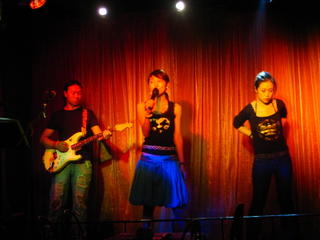
A few days ago I received a spam message on my mobile. It was different from the regular "airline ticket discount!" or "new apartments at super low prices" spam. It read:
Beijing Dynasty Hotel (five star) now urgently seeks three-company misters/misses. Healthy physique and decent looks, 18 to 40 years old. Monthly income over 10k RMB (note: $1.2k US) plus commission. Part-time ok. Consult 1370xxxxxxx Manager Liu
I read a couple of times to make sure I didn't imagine the Chinese characters for "three-company" - short for "company for drinks, company for laughter, and company for bed", basically Chinese euphemism for escorts. I dialed the 1370xxxxxxx to find out who's joking with me. A female voice answered the phone.
"Hi."
"Hi," I hesitated, not recognizing the middle-aged heavily accented voice. "I got this message that you are looking for service people."
"Yes." Beat.
"What's your requirements?" I was getting confused. How the hell did she get my number?
"Basically," there's a pause of deliberation, "we are looking for people who are young and healthy. And with an OPEN MIND. Have you done this kind of service before?"
"No, but I've always been intrigued by it." More so by the minute.
"Then come down to the hotel for an interview when you get the time."
So today when my unreliable iBook was in the shop for three hours for a checkup, I decided to pay the hotel a visit to see how they could be so blatant in spamming people to look for hooker candidates. As far as I know, I'm not in the job market; and I'd told no one that I could possibly be interested in escorting.
The grand and gold-colored exterior of the hotel was visibly from afar. I called Manager Liu while I walked pass by a Catholic church. She told me to call her again when I reached the front gate of the hotel.
I called her from the hotel lobby. She was very annoyed,
"Where are you?"
"At the front door of the hotel."
"I asked you to wait at the front gate. Do you see the flags?"
"What flags?"
"Go find the front gate and call me back." She hung up.
I almost wanted to curse with the F word, but instead I circled the block and found the flags by an arch gate leading to the hotel lobby. I called her again.
"Manager Liu, it's me again."
"How tall are you?" She spared the greetings.
"One hundred seventy two. Seventy three, maybe?"
"What are you wearing?"
"A white shirt."
"With a black man purse?"
"No no," I looked up at the many many windows above me, behind one of which there must be eyes watching me; I suddenly felt very, watched, vunerably so. "No, I carry a blue bag."
"Hmm." A pause from her end. Movie images of gunmen aiming rifles at their human targets flashed through my mind. I looked to the shabby low-rise building to the left of the fancy hotel. I prayed that she wouldn't ask me to go in there, because I might just bolt.
"Here's what you will do," her flat calculating tone continued, "go into the lobby and sit down at one of the sofas. One of my associates will interview you. She may not be able to meet you. If nobody comes and talks to you in five minutes, come out of the lobby and call me from there. And," she did a dramatic pause as if to preempt an evitable question from me, "for your own safety, please use caution and don't talk to anyone."
I walked into the hotel with the apprehension of watching Cary Grant walking into the Plaza Hotel in North By Northwest. The hotel was indeed five-star, with marble floor, staff wearing jackets and airy and well-lit lobby. I sat down at a sofa and looked at my watch. Five minutes. My chest felt tight. Who could be watching me?
A group of visitors speaking some East European language huddled near me, arguing over something. Many foreign tourists and belly-bulging Chinese businessmen with their black manpurses streamed by. A big LCD screen announced a "For a more secure world: High-level symposium on anti-money laundering/combating the financing of terrorism".
I felt anything but secure. A middle-aged Chinese man with a very Chinese flat-top haircut sat across from me; he giggled at his phone, probably at a text message. A middle-aged Chinese woman came and sat down; she looked like your average hair-salon owner from the street corner. She could be the associate. But she didn't look at me.
I looked around. Could it be the bellboy in the white uniform, the doorman in black uniform or the concierge in red uniform?
After a good 10 minutes of psychological wrestling with danger, I thought about balking. I dailed Manager Liu outside the lobby.
"What's your surname?" she asked with less annoyance.
"Wu." I had the sudden urge to get an affirmative result from this mysterious interview.
"Mr. Wu," her voice softened,"unfortunately our associate couldn't come and meet you. But she did observe from behind the concierge desk." I knew it, I knew it! I wanted to scream.
"Mr. Wu," she continued, "why do you walk with your back hunched? Why do you constantly look around?" Oh my my my, did I not make it?
"You should always walk with your back straight," now she sounded like my mother, "we don't consider a man's charm in his looks. It's in how he carries himself." Just tell me the bad news, I can handle it! I didn't know whether I was like a school boy wanting a praise from his favorite teacher or a school boy wanting to wake up from a nerve-grinding nightmare.
"But we think you are ok." Oh good, I exhaled. "Your height is ok. Your look is ok." Now I was annoyed again-just ok? "So tomorrow, come with two one-inch portrait photos and copy of your identity card. We can meet and talk business."
Now here comes the meaty party of how the mysterious business works. My legs were trembling. "Since I've never done this before, can you briefly explain how the business works?" I feigned an enthusiastic naivety.
"It's simple. We'll get you a hotel security card with your photo. When there's business, you can use your card to go upstairs to the client's room. RMB 2800 will be paid upfront when you enter the room. The next morning you'll leave with the cash. You pay us 800 and you keep the 2000."
2000?! At almost US$250, that's about the average monthly wage for Beijingers. It's a lot of money for one night, in China.
"Can I do part-time?" Would I be a sex slave?
"Of course. You can do once a month if you want."
"Will the jobs be on site or off site?" Will I be kidnapped and tied up and tortured?
"Of course onsite. Otherwise we can't guarantee safety. You don't have to worry. Just come back tomorrow and we'll show you how it works."
"But I don't have photos. And I'm leaving for a business trip the day after. Can I call you when I get back from my trip?" Should I back out? Should I?
"Hmm," she pondered for a beat, "don't worry about the photos. We'll get somebody else's photo for you. Just come back tomorrow before 4pm."
"One last question," I asked, "will the clients be men or women?"
"Of course women. We don't do homosexuality. That's abnormal!"
After the call I wandered around Wangfujing, one of the busiest shopping areas in Beijing, dazed. The curiosity for the dark and dangerous and the fear for trouble battled their way out in my head. Should I come back tomorrow?
I walked pass a film crew shooting a promotional video for McDonald. The two actors, holding chicken nuggests, exaggerated big almost grotesque smiles, showing their white teeth and pink gum. A huge crowd followed the camera. An assistant kept on commanding over the loudspeaker: "please don't follow the camera."
I walked pass a pavillion where Dior was readying for a launch party of sort. And I thought - 2000 was a big amount; many would have to labor a whole month for it; and for the escorts, all they had to do was to spend one night in a fancy hotel room.
I once had an argument with a good friend about the vampant prostitution in China. He said if the prostitutes willingly went into the business, then there shouldn't be any moral condemnation. I said no no no, that's not right.
But after this almost-escort experience, I found my resolution shaken. Maybe it was because of the stories I heard from Frank, a Hong Kong friend who had told me about the money boys he had met in Beijing and Shanghai's gay bars; many were nice straight boys from the countryside who treated three-company as purely a profession to support the family. Maybe it was becasue of the glossy design magazine my friend Jane had told me about; it makes money from presenting company marketing materials as news stories, almost exclusively.
Maybe it's because in China, there's so much easy money to be made and there's always a good reason for Chinese people to grab that easy money.
Yet is it just Chinese? The expats I worked with had no qualms about setting up accounts in Hong Kong so they would get their payments wired there to evade taxes. Anything goes for anybody.
I wandered about Wangfujing amid the department stores and wondered:
If I were straight, and from the countryside, and poor, and have wife and kids and elders to support back home; if someone then introduced me to this line of work which would earn me sums I would otherwise never dream of, would I do it?
Suddenly I got scared. It seemed all so easy. And the question was even simpler -
If I were straight, would I do it?
I stopped.
I was afraid of my honest answer.
(note: the name of the hotel was fake)







